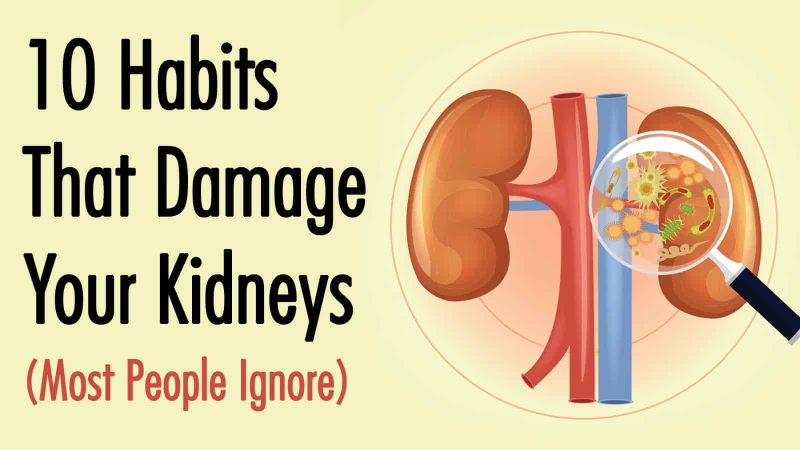
The kidneys are two bean-shaped organs, located against the back muscles in the upper abdominal cavity just below the rib cage, one on each side of the spine.
The kidneys detoxify the blood and aid the body in filtering out waste products through urine. Another primary function of the kidneys is to remove excess water from the body.
There are many reasons for kidney problems. However, many habits that people adopt can also cause huge damage to their kidneys.
Maintaining a full bladder for a long time or delaying the urge to urinate is one of the main reasons behind kidney damage.
When urine remains in the bladder for a long time, it can cause the bacteria breeding in urine to multiply. In turn, these harmful bacteria can cause a urinary tract infection or kidney infection.
Not drinking an ample amount of water can also cause huge damage to your kidneys. The main function of the kidneys is to flush out metabolic waste from the body and regulate erythrocyte production.
When the body lacks sufficient water, there is less blood flow to the kidneys because the blood becomes concentrated. This hampers the kidney's ability to eliminate toxins from the body, and more toxins in the body mean more health problems.
Regularly eating too much salt can also cause huge damage to your kidneys as well as other health problems. The kidneys metabolize 95 percent of the sodium consumed through food.
The recommended amount of salt is no more than 5 grams a day. More than this amount is harmful to your kidneys as well as your overall health. 1 teaspoon of salt is about 6 grams.
Many of us have the habit of taking analgesics (over-the-counter painkillers) to control pain and reduce fever and inflammation. But this can damage different body organs, including the kidneys.
Research shows that analgesics may reduce blood flow to the kidneys and deteriorate kidney functioning. Moreover, heavy or long-term use of over-the-counter analgesics can cause acute renal failure or chronic kidney disease known as chronic interstitial nephritis.
Protein is good for your health, but excessive consumption of red meat and other protein-based foods can increase the risk of developing kidney disease.
So, limit your intake of red meat for the overall health of your kidneys. Moreover, those who have kidney problems must avoid eating red meat as it can worsen the condition.
According to the Centers for Disease Control and Prevention, smoking is bad for almost every organ of the body, including the kidneys. Several studies have shown the connection between smoking and kidney disease.
Smoking increases blood pressure and heart rate as well as reduces blood flow and narrows the blood vessels in the kidneys. It can even accelerate the loss of kidney functions and worsen existing kidney diseases.
Too much caffeine consumption can cause high blood pressure, which in turn will put a strain on your kidneys. Over time, this can damage your kidneys.
In fact, according to a 2002 study published in Kidney International, caffeine consumption has a strong connection with kidney stones. Caffeine can increase calcium excretion in urine.
Caffeine in moderate amounts will not cause health problems for most people. You can drink 1 to 2 cups of coffee, 3 cups of tea per day.
Ignoring common infections like colds, the flu, coughs, pharyngitis, tonsillitis, and others can also cause huge damage to your kidneys.
In fact, people who have kidney disease often have a history of not resting when they are sick. Moreover, people with kidney disease are more sensitive to weather changes and often get sick.
Due to busy lifestyles, many people ignore the importance of sleep. A sound sleep of 6 to 8 hours daily is important for your overall health.
During the night when you sleep, the renewal of organ tissues occurs. Therefore, when you do not get sound sleep, this interrupts the renewal process, resulting in damage to the kidneys and other organs.
This is not intended to be a substitute for professional medical advice. Always seek the advice of your physician or other qualified health care professional.
